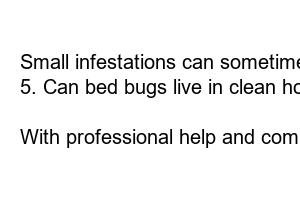빈대 예방
Title: Sleep Tight and Bed Bug-Free: Essential Tips for Bed Bug Prevention
Introduction:
Imagine waking up to itchy red welts and unsightly bites all over your body. While bed bugs might seem like a distant nightmare, they can easily become a reality if proper precautions are not taken. In this blog post, we will explore effective measures to prevent bed bug infestations and ensure you can sleep soundly without worrying about these pesky pests.
1. Understanding Bed Bugs:
Bed bugs are small, oval-shaped insects that thrive on the blood of humans and animals. They are nocturnal creatures that hide in crevices and cracks during the day and come out at night to feed on unsuspecting victims. Knowing their habits and characteristics is the first step in keeping them at bay.
2. Regular Cleaning and Vacuuming:
Consistent cleanliness is key to bed bug prevention. Regularly vacuuming carpets, rugs, and upholstery helps eliminate any eggs, nymphs, or adult bed bugs present. Be sure to dispose of the vacuum bag or empty the canister outside, away from your home, to prevent reinfestation.
3. Be Mindful of Second-Hand Furniture:
Buying second-hand furniture can be a cost-effective way to furnish your home, but it can also introduce bed bugs. **Thoroughly inspect** any used furniture before bringing it into your home. Pay close attention to seams, joints, and crevices where bed bugs often hide. Consider using a protective cover for your mattress and box spring as an additional precaution.
4. Practice Travel Vigilance:
Bed bugs are notorious hitchhikers and can easily latch onto your luggage or clothes while traveling. **Inspect** your hotel room thoroughly before settling in. Look for signs of infestation such as bloodstains, fecal matter, or shed skins. Store your suitcases on elevated racks or luggage stands, away from the bed, to minimize the chances of any unwelcome guests stowing away in your belongings.
5. Seal Cracks and Crevices:
Sealing cracks and crevices in your home is an effective way to prevent bed bugs from entering. Pay close attention to baseboards, electrical outlets, and areas around pipes and cables. Use caulk or sealant to seal any openings and deny bed bugs easy access to your living spaces.
6. Seek Professional Help:
In case of a severe infestation or persistent bed bug problem, it is advisable to seek professional assistance. Pest control experts have the knowledge and tools to eliminate bed bugs effectively. They can conduct inspections, provide treatment options, and offer guidance on preventing future infestations.
Summary:
By staying vigilant and implementing preventive measures such as regular cleaning, thorough inspections of second-hand furniture, cautious travel practices, sealing cracks, and seeking professional help if needed, you can greatly reduce the risk of bed bug infestations. Remember, early detection and proactive prevention are the keys to a happy, healthy, and bed bug-free home.
FAQs:
1. How long can bed bugs survive without feeding?
Bed bugs can survive for several months without feeding, depending on environmental conditions.
2. Can bed bugs fly or jump?
No, bed bugs cannot fly or jump. They move by crawling.
3. Are bed bug bites dangerous?
While bed bug bites can cause itching and discomfort, they are not known to transmit diseases.
4. Can I eliminate a bed bug infestation on my own?
Small infestations can sometimes be managed using DIY methods, but a professional pest control service is often necessary for significant or recurring infestations.
5. Can bed bugs live in clean homes?
Absolutely! Bed bugs are attracted to warmth and carbon dioxide, not dirt or filth. They can infest even the cleanest of homes.
6. Can bed bugs be completely eradicated?
With professional help and comprehensive treatment, it is possible to eliminate bed bugs completely. However, ongoing prevention measures are crucial to prevent future infestations.

